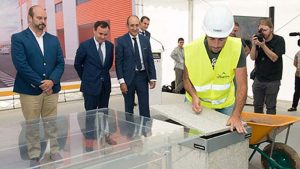
Achieving a smaller sorter footprint: theory vs reality
 The design of many sortation systems is based on the theoretical capacity that the system must achieve to meet the customer’s demand forecasts. There is, however, a crucial difference between a system’s theoretical capacity and the operational capacity that it can achieve in the real world. Article by BEUMER Group.
The design of many sortation systems is based on the theoretical capacity that the system must achieve to meet the customer’s demand forecasts. There is, however, a crucial difference between a system’s theoretical capacity and the operational capacity that it can achieve in the real world. Article by BEUMER Group.
For many parcel and post hubs, a key factor is to achieve the required operational capacity in a smaller footprint by optimising the parcel flow.
A new cross-docking super-hub, located just outside Madrid in the ‘Corredor del Henares’, is one example of how optimisation can combine a higher capacity from a smaller footprint. Owned by NACEX, part of Logista, the super-hub has a total area of 11,400 square meters, making it the largest distribution centre in Spain. It is also an important part of the NACEX’s strategy of continuous improvement as a leading post and express courier operating throughout Spain, Andorra and Portugal.
One of the main factors affecting the capacity at the NACEX super-hub is the need to handle items across a variety of shapes and sizes. The mix ranges from fliers to items measuring up to 1000mm in length. The design had to ensure that the long items could be sorted efficiently without reducing the overall system capacity.
BEUMER’s solution was to base the system on two LS-4000CB cross-belt sorters. The sorters will provide NACEX with the capacity to handle a total of 24,000 items per hour, with 12,000 items per sorter, and a minimum read-rate of 99.6%.
The item flow begins at two automated induction areas. From the induction area, the parcels and fliers are routed to the six induction units which receive the in-feed for each sorter. The induction units on the parcel sorter are fitted with weigh-scales so that the weight of each item can be verified. The system also integrates a conveyor system and numerous chutes which are integrated into a specially-designed steel infrastructure.
The parcels and fliers will be sorted and discharged to a total of 114 loading docks. Ten of these docks will be used to load trailer trucks for national deliveries, whilst the remaining docks will be allocated for loading vans or light vehicles for deliveries to the local area.
Daily optimisation
The day-to-day operation of the system will be optimised by the high- and low-level controls in BEUMER’s BG Fusion software suite. Combining the controls for each sub-system within a single graphical display which will give the control room the highest level of monitoring and operational control to ensure maximum system availability and capacity.
The software suite will also integrate business logic and the Supervisory Control and Data Acquisition (SCADA) system. By collating this data, the Fusion software suite will enable NACEX to continually assess and optimise the flow of items to maintain the overall efficiency of the process flow and the operation of the system.
The importance of hard metrics
Whilst BEUMER analysed the handling mix and process flow for the new system, NACEX was analysing the metrics for their legacy sorters which had also been installed by BEUMER.
“Every potential supplier talks about their experience in the field and the quality of their systems,” says Manel Orihuela Chacón, General Subdirector at NACEX. “With BEUMER it was different because we were able to rely on hard facts. Having had BEUMER sorters in operation in some of our other hubs for more than a decade we were able to check their performance against key metrics. These metrics included system availability, maintainability, product life-cycle costs, durability and adaptability and we found all of the sorters to be in perfect shape, fully maintainable and adaptable for our future needs.”
Sustainable sorting
The new super-hub was designed to comply with the highest standards of quality and sustainability, from the initial concept, through to the materials used in its construction. This focus on sustainability resulted in the Madrid super-hub becoming one of the first logistics platforms to receive Leadership in Energy and Environmental Design (LEED) certification from the US Green Building Council.
It was important, therefore, for the sortation system to contribute to the overall sustainability of the super-hub. The use of highly energy-efficient Linear Synchronous Motor (LSM) drives will enable the LS-4000CB sorter to reduce energy consumption by up to 75% compared to sorters driven by conventional motor technologies. This will enable the super-hub to offer a sustainable foundation for NACEX to build on recent growth and to strengthen its reputation for providing the highest levels of service.
Manel Orihuela Chacón concludes that: “Understanding the impact of optimisation and the difference between theoretical capacity and operational capacity provided an important insight for the NACEX team. This insight, combined with the proven ability and longevity of our legacy sorters was a deciding factor in choosing BEUMER’s design. It meant that, in addition to getting the optimal solution, we will also get a proven and reliable, long-term partner when the new super-hub begins operation in at the end of 2018.”








